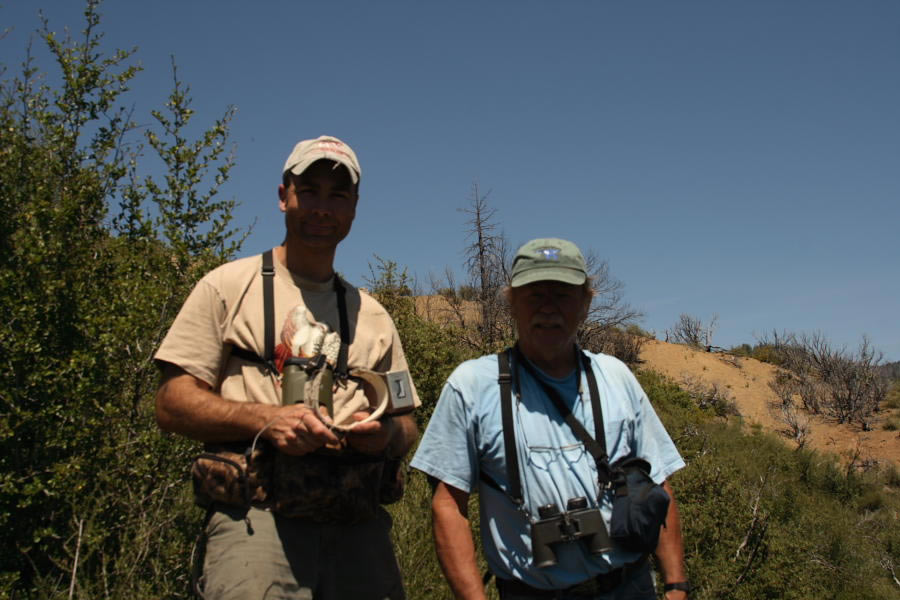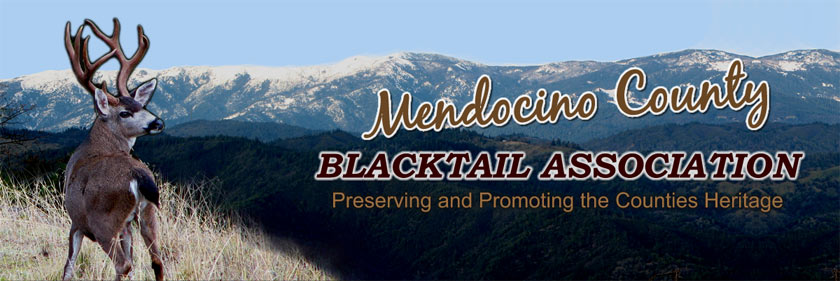MCBA works with LEAR Asset Management to clean up our forests (2011)
A California Fish and Wildlife grant given to MCBA led to the eradication of an illegal marijuana grow.
The cleanup was handled by LEAR Asset Management and documented by
Mendocino TV
(as commissioned by the
Jere Melo Foundation), along with other members of the local media.
MCBA joins DFG advisory committee
(This article is from the
2011 California Hunting Digest: Big Game PDF.)
New Committee Advises Department
on Special Funds
Senate Bill 1058 (Harman) made specific and important changes to existing law regarding revenues
from the sale of antelope, elk, deer, wild pig, bear and sheep tags, including any fund-raising tags.
Revenue from these sales must be deposited into the Big Game Management Account to provide
separate accountability for the receipt and expenditure of these funds. The law stipulated the permitted
uses for these funds, including acquiring land, completing projects, implementing programs to benefit
antelope, elk, deer, wild pigs, bear, and sheep, and expanding public hunting opportunities and re-
lated public outreach. DFG may also use funds from the Big Game Management Account to pay for
administrative and enforcement costs of the programs and activities identified as permitted uses.
The new law also provides for an advisory committee made up of representatives, invited by DFG’s
director, from interested nonprofit organizations that have goals and objectives directly related to the
management and conservation of big game species. This committee is authorized to review and
provide comments to DFG on all proposed projects funded from the Big Game Management
Account. The law also requires DFG to post budget information and a brief description on an
website for all projects funded from the Big Game Management Account.
Currently, the Big Game Advisory Committee includes:
- Robert Moore and Wayne Raupe California Bowmen Hunters
- Mike Ford Rocky Mountain Elk Foundation
- Kyle Meintzer California Chapter of the Wild Sheep Foundation
- Dwight Ortmann and Kathy Lynch Safari Club International
- Mike Gulley, Randy Morrison and Rich Fletcher Mule Deer Foundation
- John Kunkle Californa Houndsmen for Conservation
- Matt Rogers California Deer Association
- Mark Hennelly and Bill Gaines California Outdoor Heritage Alliance (COHA)
- Rich Klug Siskiyou County Fish and Game Commission
- Paul Trouette Mendocino Blacktail Association
- Steve Hill Society for the Conservation of Bighorn Sheep
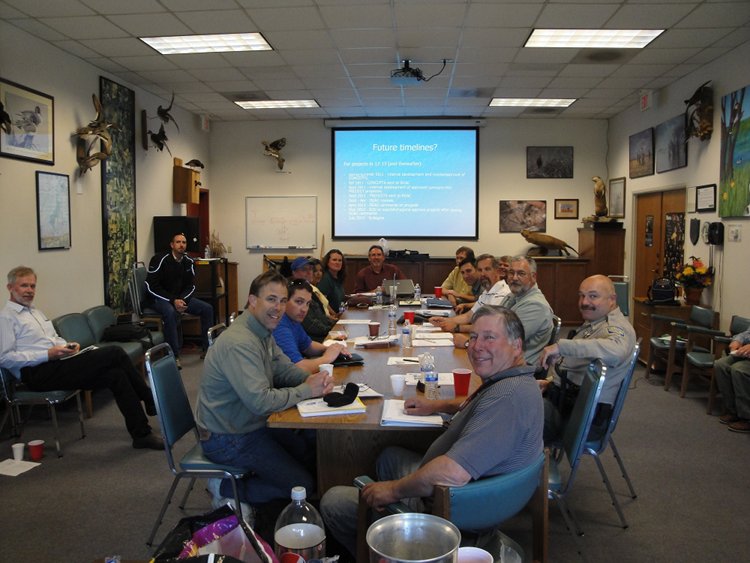
Mendocino County Blacktail Association hosts historic summit
meeting on future of blacktail deer in the B-Zone
Known as California's "deer factory," if you want to find world-class blacktail bucks with antler
spreads of 25-28" or more, historically the best place in the world to go is northwestern California's "B
Zone" that stretches along the coast from the Oregon border to Mendocino and Glen Counties to the
south, and from I-5 on the east to the Pacific Oregon.
According to late renown wildlife biologist Raymond Dasmann, with prime habitat conditions the B-
Zone should support as many as 55 blacktails per square kilometer. However between 1989 and 2009
the harvest of bucks in the B-Zone has dropped 57%, in large part due to a dramatic decline in the
region's deer herd. The 2000 harvest of bucks in Mendocino County was 1,256, a decline of 3,976
bucks per year since the 1950's.
The decline in deer has cut down the number of hunters in the B-zone, where the annual deer
hunt pumps an estimated $35 million a year into the region's economy when all is well.
Responding to the dramatic decline in deer in Northwestern California, to rally the region's natural
resources conservation leaders on February 25, 2011, the Mendocino County Black Tailed Deer
Association, a regional 501-C-3 non-profit organization founded in 2005, hosted a historic day-long
Blacktail Summit meeting at the Red Lion Hotel in Eureka.
Those in attendance included representatives of state and federal agencies, members of county Boards
of Supervisors,and County Fish and Game commissions from 10 northern California counties, and
representatives of conservation groups.
The participants discussed many of the problems associated with the dramatic decline in blacktail deer
in the area including: the decline in deer habitat due to the dramatic decline in fires (planned and wild)
and logging; an increasing number of predators; and poaching and wanton use of pesticides due to a
proliferation of illegal marijuana gardens on public wildlands.
"MCBA hosted this Summit in an attempt to begin to move agencies, policies, and projects to the fore
front of those in charge of the resources, in hopes reversing the current negative factors that are
destroying the Wildlife in the public lands," said Paul Trouette, President of MCBA who planned and
hosted the summit. Retired Department of Fish and Game wildlife biologist Jack Booth, and Dave
Willoughby, vice president of MCBA, were also in attendance representing the sponsoring
organization. "I think the summit was a call to action that everyone in the room heard and responded
favorably to" Trouette added.
Those attending the felt it was long overdue and badly needed. A steering committee was formed to
develop a calendar of subsequent meetings and a plan for action. The next meeting of the steering
committee will be in Weaverville, CA, April 28, 2011 and join them for their upcoming annual fund-
raising dinner on April 16.
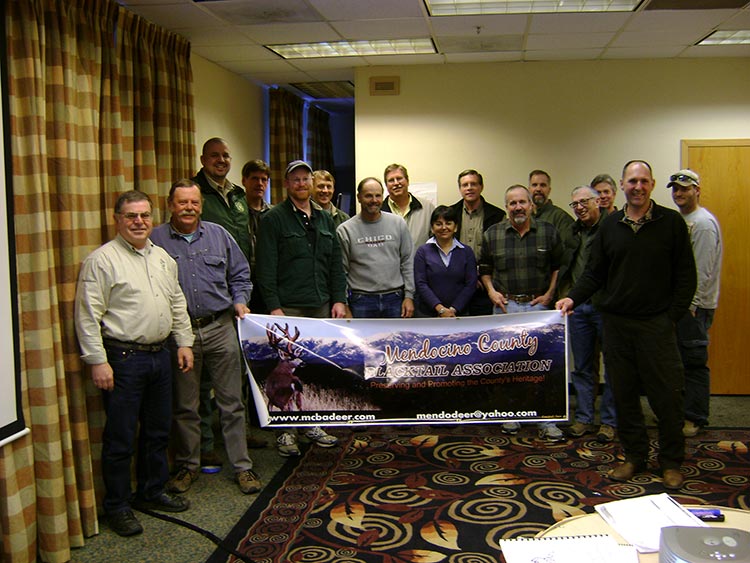
MCBA’s Efforts Make NRA Hunting News
This article was taken from the Willits news by the
“American Hunter Magazine”, which published part of the MNF study
by outdoor writer Gary Roussan of Willits, CA.
More Feral Hogs Mean Fewer Blacktails?
A three-year research project by the University of
California-Davis and The California Department of Fish and Game
is trying to determine why blacktailed deer numbers have declined
precipitously in the Mendocino National Forest and surrounding
private property. While habitat degradation is undoubtedly at
work growing populations of wild pigs may be a factor, too. One
focus of the project, Willits News reports , is to determine if
wild pigs are directly competing with the deer for food and
habitat. The pigs may also be providing an abundant food source
for mountain lions, increasing the number of cougars, which then
kill more deer. Mountain lions and feral hogs will be collared
and tracked to determine lion predation rates for hogs and deer.
Covelo Study In The News
The
groundbreaking study that the MCBA is participating in has been in the news.
Here's two of the articles:
http://outdoornewsdaily.com/index.php/archives/13405
http://www.dfg.ca.gov/news/news10/2010080303-Deer-Study.html
And some pictures:
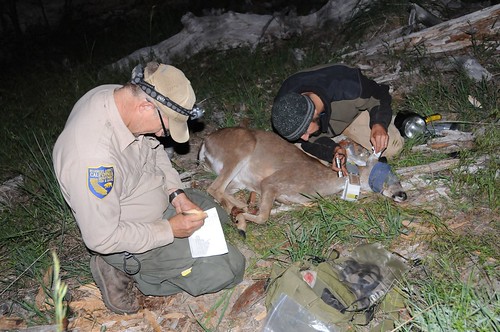
(photos by Harry Morse)
MCBA Tip: Fences And Deer
Most ranchers and
land managers are not aware of the associated problems of cross-fencing
their pastures. Cross-fencing affords predators the advantage of catching
young deer by running them into it. It also is a potential entangling device when
deer are caught jumping them. As a result of these factors, cross-fencing is
responsible for many blacktail deaths each year. Make sure your deer management
strategy includes proper fence building.
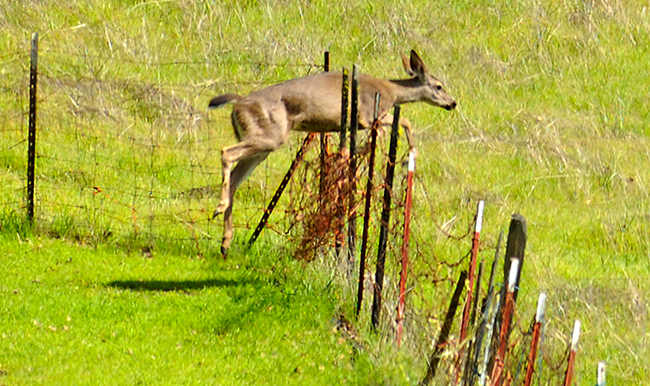
Black Butte River Habitat Restoration Project
After talking with Lee Johnson, District Ranger, and upper
lake district coordinator Terry Nickerson, our Black Butte River
Drainage Project is tentatively being slated for the fall of 2011
(decision expected in August).
This project is designed to use a controlled burn to treat the old decadent
chaparral and browse species, and reduce the noxious weeds in the
winter grasslands; so that the deer will have new forage. We will
be burning in a yearly rotational pattern going north from the Clifton Ridge
area to the Indian Dick area. There are thousands of acres
that need treatment, and the MCBA targeted these areas as a much needed
project. The MCBA is planning on contributing upwards of $ 10,000.00
plus in 2011 -- and more in subsequent years to come -- to this
project. The USFS also is contributing funding to help with habitat
enhancement. USFS Ranger Lee Johnson has been a very supportive
component to getting our project off the ground, Terry Nickerson
has also been very instrumental in drafting the projects nuts and
bolts. Thanks, gentlemen; and thanks to all the MCBA members who have
helped make this project possible.
Field of Dreams Sponsorship
The MCBA -- along with many other great organizations -- helped to sponsor
the annual "Field of Dreams" in 2010; an event to give joy to children
with special needs and their families through outdoor activities. We look
forward to helping out again with this truly special event in 2011.

MCBA Helps Fish and Game retrieve deer collars.
Fish and Game tranquilize deer yearly in their management
program, and place radio and GPS units on them so they can track
the deer for herd data studies. It is vital to have this information to
understand how deer are responding to new and old influences in
their habitat; such as lion predation, coyote predation, bear
predation , natural mortality due to environmental changes and
other things that haved changed over the years -- such as the
commercial marijuana industry which has been devastating the deer herds
in public lands. MCBA volunteer Jack Booth -- a retired Mendocino
County Fish and Game Biologist -- Paul Trouette, the President of MCBA, and
MCBA member Lee Nerli spend their time here in 2007 finding the
collar from a deer in the Mendocino National Forest Andersen Creek
Area.
